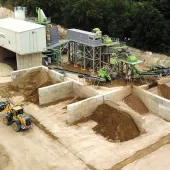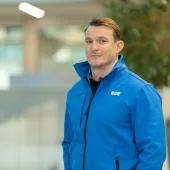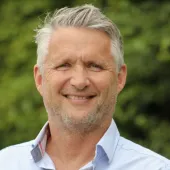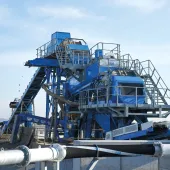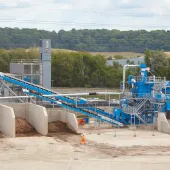Demonstration of CDE Wet Processing Equipment

First published in the July 2017 issue of Quarry Management as A Problem Solved
Eurovia host demonstration of CDE wet processing equipment to show how problematic crushed granite sand fraction at Dubina Skala Quarry, in Slovakia, has been transformed into a valuable product
In June 2017, Eurovia - Kameňolomy s.r.o. partnered with CDE to host an open day at a quarry in Slovakia, where the company showcased its new CDE 60 tonnes/h wet processing plant, which will is supplying materials for a major motorway construction project.
Eurovia, part of the Vinci Group, are one of the global leaders in transport infrastructure construction and urban development. Active in 15 countries around the world with close to 1,300 industrial and commercial entities, they employ more than 38,000 people and generated a total revenue of €8.2 billion in 2014.
The company has a large presence in Slovakia where it operates 10 hard rock aggregate quarries and one sand and gravel plant. The CDE wet processing plant was installed in 2016 at Dubina Skala Quarry, near the city of Martin, in northern Slovakia, where the main product is a 0–4mm crushed granite.
Eurovia supply concrete for urban development and road projects, including a major road construction project to develop an 11km stretch of the D1 highway between the cities of Martin and Zilina, which is currently under construction with work scheduled to continue until October 2018. This project has a budget of €427.2 million and comprises
11 bridges and two tunnels, so the requirements for aggregates is ongoing and significant.
The project
Dubina Skala Quarry is a 100-year-old granite quarry situated in rural Slovakia. Due to the remoteness of its location and the lack of access to a water supply, the customer needed the new wet processing plant to have a low energy requirement and the ability to recirculate water around the system.
Eurovia’s main objective was to turn an unsaleable 0–4mm crushed granite sand fraction – due to high levels of contamination (8–9% 0–0.063mm fraction in the feed material) – into a high-value product. As the quarry is located at the top of a mountain and has limited access to water supplies, removal of the granite of contaminants was proving challenging.
After investigating various options over a number of years, Eurovia eventually opted for what they saw as the only comprehensive solution that would meet their specific circumstances: a CDE EvoWash wet processing plant combined with an AquaCycle thickener and a filter press.
Meetings with the CDE team convinced Eurovia that the Northern Ireland-based company had the technical capabilities and experience to deliver the project successfully, and through a process of co-creation with Eurovia, CDE prepared a bespoke design for a modular installation that would fit the limited space available at the quarry, whilst addressing water efficiencies and significantly increasing product quality.
Jaroslaw Modrzejewski, CDE’s area sales manager for Poland, the Czech Republic and Slovakia, was the main point of contact for Eurovia. He was able to use a number of previous reference projects and organize site visits to other CDE installations. ‘To ensure we provided the best solution, I arranged for several material samples to be washed by another local company’s CDE plant and quality-checked at CDE’s headquarters in Northern Ireland. This allowed us to make an accurate calculation of the output for the new plant in order to provide guaranteed rates in our contract, providing the customer with additional confidence to proceed,’ he explained.
CDE solution
A first within the region, the Eurovia CDE installation consists of an EvoWash 71 wet processing plant, an A200 AquaCycle thickener and a filter press. A buffer tank, an AquaStore and a FlocStation complete the plant.
Mr Modrzejewski continued: ‘This is the first full water treatment plant in this region. It solves the problem that all other quarries have experienced and struggled with: what to do with the final 0–4mm fraction that is heavily contaminated with dusts after the crushing process. Eurovia have now positioned themselves as the leader in this field and we are proud to have achieved this project as a reference site in the Slovak and Czech markets.’
Commenting on Eurovia’s specific need for low water consumption, Mr Modrzejewski said: ‘Our plant uses only a few cubic meters of water per hour, which allows Eurovia to wash their low-value product and turn it into high-value washed crushed sand, opening up new markets for the company.’
Plant process
The extracted dry material travels by conveyor to a feedbox from where it enters the sump of the EvoWash 71. From the sump the sand is pumped to a cyclone that separates the material into the required size – a key benefit of the EvoWash is that it does this without losing fines materials. The washed 0–4mm sand from the cyclone is sent to a dewatering screen and then travels by conveyor to be stockpiled.
Meanwhile, the fine –63-micron material is sent to the AquaCycle thickener where a small amount of polyelectrolyte flocculant is added to the water, via the automatic dosing station, to force the fine particles to settle at the bottom of the thickener tank. The clean water at the top of the tank overflows the weir and is stored in the AquaStore tank before being recirculated around the plant, helping to reduce the amount of fresh water required. The waste sludge is discharged into a buffer tank where a constantly rotating motorized rake ensures the material does not settle and solidify. The sludge is held in the buffer tank before being processed in the filter press to recover more water.
Following testing of the materials, it was determined that the side-beam filter press would require 36 plates (each 800mm2) to achieve a processing rate of 3 tonnes/h. Currently, the filter press is completing four press cycles per hour. During each cycle the filter plates fill with sludge and are compressed under high pressure to remove moisture. A dry filter cake then drops into a holding bay from which it can be easily transported and stored.
Conclusion
Vladimir Sulovec, Eurovia’s main production director in Slovakia, said: ‘Working with the CDE team has been a very positive experience. Thanks to their professionalism and collaborative spirit, Eurovia have installed the most efficient wet processing solution for the requirements of our quarry…and the first one of its kind in the region, which we are very proud of.
‘Not only are we saving water and increasing the quality of our overall product, but we have gone further and turned a highly contaminated granite product we that believed we could never sell into a highly profitable sand product.’
- Subscribe to Quarry Management, the monthly journal for the mineral products industry, to read articles before they appear on Agg-Net.com


